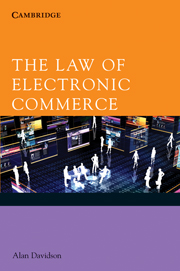Book contents
- Frontmatter
- Contents
- Acknowledgements
- Table of Cases
- Table of statutes
- 1 The law of electronic commerce
- 2 The rule of cyberspace
- 3 Electronic commerce and the law of contract
- 4 Shrinkwrap, clickwrap and browsewrap contracts
- 5 Electronic signatures
- 6 Copyright issues in electronic commerce
- 7 Electronic commerce – trade marks, patents and circuit layouts
- 8 Domain names
- 9 Domain name disputes
- 10 Uniform domain name dispute resolution policies
- 11 Jurisdiction in cyberspace
- 12 Defamation in cyberspace
- 13 Privacy and data protection in cyberspace
- 14 Electronic mail and online presence
- 15 National electronic surveillance
- 16 Cybercrime
- 17 Evidence of electronic records
- 18 Censorship – Broadcast and online content regulation
- 19 An international perspective
- Appendix A Electronic Transactions (Victoria) Act 2000
- Appendix B UNCITRAL Model Law on Electronic Commerce
- Appendix C Selected provisions Copyright Act 1968 (Cth)
- Appendix D ICANN Uniform Dispute Resolution Policy (UDRP)
- Appendix E .au Dispute Resolution Policy (auDRP)
- Appendix F National Privacy Principles
- Index
- References
13 - Privacy and data protection in cyberspace
Published online by Cambridge University Press: 05 June 2012
- Frontmatter
- Contents
- Acknowledgements
- Table of Cases
- Table of statutes
- 1 The law of electronic commerce
- 2 The rule of cyberspace
- 3 Electronic commerce and the law of contract
- 4 Shrinkwrap, clickwrap and browsewrap contracts
- 5 Electronic signatures
- 6 Copyright issues in electronic commerce
- 7 Electronic commerce – trade marks, patents and circuit layouts
- 8 Domain names
- 9 Domain name disputes
- 10 Uniform domain name dispute resolution policies
- 11 Jurisdiction in cyberspace
- 12 Defamation in cyberspace
- 13 Privacy and data protection in cyberspace
- 14 Electronic mail and online presence
- 15 National electronic surveillance
- 16 Cybercrime
- 17 Evidence of electronic records
- 18 Censorship – Broadcast and online content regulation
- 19 An international perspective
- Appendix A Electronic Transactions (Victoria) Act 2000
- Appendix B UNCITRAL Model Law on Electronic Commerce
- Appendix C Selected provisions Copyright Act 1968 (Cth)
- Appendix D ICANN Uniform Dispute Resolution Policy (UDRP)
- Appendix E .au Dispute Resolution Policy (auDRP)
- Appendix F National Privacy Principles
- Index
- References
Summary
‘Privacy’ has numerous meanings, and its importance varies greatly among individuals, communities, organisations and governments. It is an aspect of freedom and human rights. Civil libertarians may believe that our actions and behaviour should not be subject to public or governmental scrutiny; protectionists may accept such erosions for the greater good in the name of law and order. The development of technology, together with social, economic and political factors, has raised the antennas of those concerned with interference from governments, enterprises and others on personal freedoms.
Historically, governments seem to have pursued increasing and systemic invasions of privacy in the name of law and order, fighting crime and terrorism. However, their role is in fact to ensure and balance security issues and the proper protection of the privacy rights of the individual. In the 1990s the Clipper Chip was proposed by the US government, ostensibly for the purpose of allowing the government to override individual encryption to protect society from ‘gangsters, terrorists and drug users’. Such a process would have allowed the government to access and decipher all encrypted files. The proposal was unsuccessful. In Australia in 1984, an attempt to pass a Privacy Act failed because it set in place an anti-privacy provision: a central national identification card.
Search engines such as Google use sophisticated programs called spiders, robots and wanderers to trawl the internet gathering data on several billion websites, creating an index that handles several million enquiries per day.
Information
- Type
- Chapter
- Information
- The Law of Electronic Commerce , pp. 216 - 242Publisher: Cambridge University PressPrint publication year: 2009
